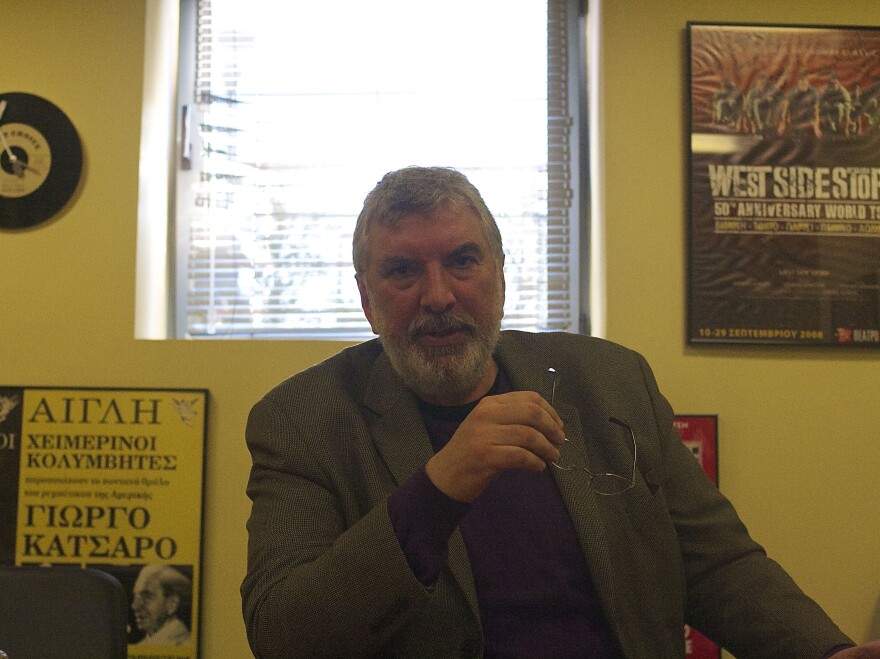It's a full house at the 2,000-seat Badminton Theater in Athens. On stage is a musical about the singer Sofia Vembo, whose warm contralto voice comforted Greeks during World War II.
The song that is bringing the audience, mostly Greeks in their 60s and 70s, to tears and applause is called "Paida Tis Ellados, Paidia," or "Children of Greece." Vembo sang it to Greek soldiers as Italian and German forces invaded the country.
On this evening, it's sung by 75-year-old Marinella, the platinum-haired icon of modern Greek music. She's joined by a young cast in 1940s dresses and military garb.
In the audience, a young, green-eyed dermatologist named Fiori Kousta is passionately singing along.
"This song gives me hope," she says, "because it reminds me that Greeks have been through much worse than what we're going through today. We may have the same enemies — the Germans — but watching this, I think we will fight and emerge victorious again."

'The Entire Nation Is Depressed'
The story of Greece dates to ancient times, but its modern chapter has taken a terrible hit since the 2010 debt crisis. Greeks were humiliated as their bankrupt country accepted billions in international bailout loans under very tough conditions. The global blaming and shaming has left Greeks questioning their worth and identity.
"The entire nation is depressed right now," says Michalis Adam, who leads the Badminton Theater. "And there is not someone to inspire them to do something good. Besides all the other problems — besides the poverty, besides the unemployment — there is no hope."
So Adam, a tall, gray-bearded man who studied theater in the United States, is trying to inspire hope through musicals that celebrate the previous century, when Greece suffered through poverty and wars and persevered.
For the past two years, Adam has been staging the musicals at his base in the Badminton Theater, part of a leafy, sprawling site that was a venue for the 2004 Olympics.
Greeks have been flocking to see the shows. They realize the problems they're seeing today, like corrupt politicians robbing the country blind, were also problems 100 years ago, Adam says.
One musical that Adam staged last year, Tha Se Paro Na Fygoume, or "I Will Take You Away," celebrated an early 20th-century form of Greek vaudeville that skewered crooked leaders. The era also reminded Greeks of another time when they were dependent on foreign loans.
"After the first war, the people here were very poor; we were getting a lot of loans from abroad, from Britain mostly," Adam says. "There was also a British governor here, watching like the troika [Greece's eurozone and International Monetary Fund lenders] watches us now. It was pretty much the same situation."
The musical sold more than 90,000 tickets, nearly as many as another production, on the life of Mikis Theodorakis, Greece's greatest living composer.
Americans will remember Theodorakis for his bouzouki-inflected soundtrack to the 1964 movie Zorba the Greek.
But for Greeks, he is the composer who memorialized the country's greatest poets, including Nobel Prize winners George Seferis and Odysseas Elytis, by setting their verses to music.
And he's also the resilient fighter who fought decades of political repression.
"He was in exile for so many years, he was in prisons, but he followed his dream," Adam says. "He did what he wanted to do through very difficult situation. This is today a very huge example for people to say, OK, we are facing very bad situation, but let's do something about that."
Voices Of Past Victories
Adam's latest musical, Marinella Meets Vembo, honors Sofia Vembo, a woman who overcame poverty, sexism and war to become the country's voice of victory during and after the second world war.
Vembo died in 1978, but her voice still inspires Vasso Sambarti, a retired civil servant. She came to the premiere with her daughter, Fiori Kousta.
As the cast croons the finale, "Panta Mazi" ("Together Forever"), a song about unity in hard times, the audience sings along. Mother and daughter clap and chair-dance, their faces bright with joy.
"I can barely go out anymore because I'm so down," Sambarti says. "Everywhere you go, in the supermarket, or for coffee with your friends, all you hear about are stress and worry. All you see is deflated people."
Like many Greeks her age, she's worried about paying bills on a dwindling pension and the prospects for her daughter in an economy that's hemorrhaging jobs.
"But these songs, at least they give us a little cheer," she says. "They let me escape, even for a little bit."
Copyright 2021 NPR. To see more, visit https://www.npr.org. 9(MDEwMTk5OTQ0MDEzNDkxMDYyMDQ2MjdiMw004))




